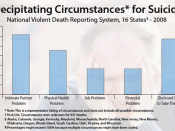(, 1)
Suicide is intentional self-inflicted acts that end in
death('Suicide,' Compton's). After a series of traumatic
events, normal coping abilities can be pushed over the edge;
the result may be suicide. In each year, an average of
30,000 suicide deaths occur in the United States. It is
estimated that 5,000 of those suicides are committed by
teenagers(SAVE, 2). One major reason that the suicide rate
among teenagers is so high, is that the teenage years are a
period of commotion. New social roles are being learned,
new relationships are being developed, bodily changes are
occurring, and decisions about the future are being made
during the teenage years.
Teenagers tend to commit suicide after large changes,
significant losses, or abuse has occurred in their lives.
An important change in a relationship, school or body image
may contribute to a teenagers' tendency to commit suicide.
The death of a loved one, the loss of a valued relationship,
and the loss of self esteem are some significant losses
which might be a factor in teen suicide('The Real World
[Suicide: Facts],' 1).
Perceived abuse such as physical,
emotional, psychological, sexual, social abuse or neglect
can lead to self-murder('Teen Suicide,' 3). Significant
changes, losses, and abuse can promote suicidal tendencies.
Few suicidal people have some type of depression, yet
those who have one can be provoked to commit suicide. There
are two main types of depression suffered by
(, 2)
suicidal people('Suicide,' {Grolier}). The first type is
reactive depression. This type of depression is the
reaction of a difficult and often traumatic experience.
Endogenous depression is the second type of depression. It
is the result of a mental illness which is diagnosable by a
professional. Some suicidal people have a combination of
both reactive depression and endogenous depression. Others
could have a...


